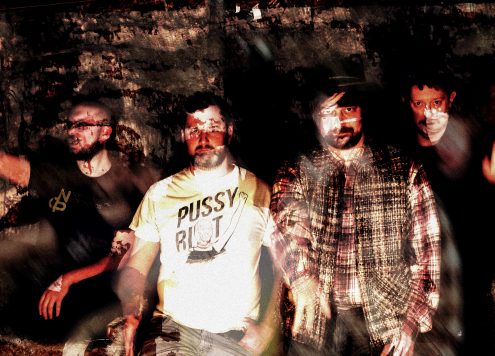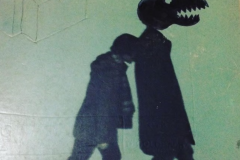Photo by Mabel Suen, Art by Arnulf Rodler
St. Louis Missouri trio Yowie is a complete and utter musical enigma. Less a band than a carefully orchestrated brain trust that examines every note, beat and nuance at the micro and macroscopic levels, they are the kind of unit that will spend hours upon hours pouring over a seven second piece of music to ensure that it is perfectly crafted and presented. Naturally, this sort of endeavor isn’t for the faint of heart; only those with unparalleled dedication to their craft would undertake this sort of task for even a few hours, let alone 17 years.
Currently comprised of guitarist Jeremiah Wonsewitz, drummer Shawn “The Defenestrator” O’Connor, and guitarist Christopher Trull (formerly of Grand Ulena), the band release their third album, Synchromysticism on April 21 via Skin Graft Records, their label home of many years. Five years since their Damning with Faint Praise, Synchromysticism is a challenging and “ecstatic” record that is powerful, dense and a lot to digest, even at its 30 minute run time, in one sitting.
Ghettoblaster recently spoke with The Defenestrator and Trull about the undertaking, their genre defying sound, and cryptozoology. This is what they said.
There has been a lineup change. What did Christopher Trull bring to the table?
The Defenestrator: I was quite familiar with his playing in Grand Ulena and knew him to be not only an excellent player, but one who was not scared of hard work, who understood the nuance necessary to make this type of music. I think there are other players who could pull off some of these feats from a purely technical perspective, but the hardest part of Yowie is about structure, both at the micro and macro levels. When the part you are playing is specifically about the intricate overlay of non-overlapping rhythms, a slight error in timing isn’t just a slight annoyance; it is a complete structural collapse, and an utter failure. There are lots of great players out there who just aren’t willing to work on a four second part for hours on end until they phrase it correctly. You have to have an extremely high frustration tolerance, and that’s not that common of a trait. Lots of bloody fingers, cramps, and repetitive motion injuries in this band.
He has brought a tremendous amount of creativity and an attention to melody that we didn’t have before. He’s really given some of these rhythmic structures a memorable and moving quality. In our previous albums, the melodic aspects were sort of an afterthought; it was all about rhythm. For this album, we have given tremendous attention to both, and it makes the music much more engaging.

Yowie has been a band for over 15 years now. What is it about your chemistry or relationships with each other that continues to make this a rewarding endeavor for you?
Christopher Trull: I think the key is extreme stubbornness!
TD: He’s not joking. We are doing something distinctive, and I think the tenacity required to pull that off is the main contributor to our longevity. Not very many people can say they are fluent in the very counterintuitive approach we use, and most musicians aren’t willing to put in the amount of work it takes to execute it.
Your band has always been one that is difficult to characterize. Do you find this phenomenon a blessing or a curse?
TD: Unambiguous curse when it comes to getting the word out. People tend to want to use labels when discussing music, like “math rock” or “prog rock” or “avant garde” or “experimental.” Each of these conjures up a sort of schema that is misleading when applied to us. We are not happy tappy music that jams in 6/8. We don’t sound like Rush or Yes. We aren’t noisy improvisational music. People want a simple, concise label for what we do and there just isn’t one.
I would say, though, I wouldn’t have it any other way. I want my music to be authentic and personal enough that you can’t easily say “sounds like X.” You need at least a sentence, maybe a paragraph. To the extent that people know about us, it is often because someone said something like “Listen to this- what in the fuck is happening, here?” The sort of person who is intrigued by that may find us interesting.
Have any of you studied music composition at a scholastic level?
CT: I took some general music theory classes in high school and studied guitar in private lessons for years, but never formally studied composition.
TD: Neither me, nor Jeremiah have. We fumbled our way through discovering a lot of compositional tools by simple trial and error in the basement. Turns out, there are names for these things we thought we invented down there.

What have been the most rewarding parts of working with Skin Graft? What have been your proudest moments as a result of working with them?
TD- Simply being on the label means we are in some ways associated with some of the incredibly talented and unique artists who came before us. That has been an honor all by itself.
CT: Agreed! I have been a fan since I bought the very first SG record/comic book (Dazzling Killmen’s “Killing Fever” split 7″ with Mother’s Day) when it came out.
Is there a grand scheme or theme behind Synchromysticism?
TD: Oh, yeah. At two levels; conceptual and compositional. At the conceptual level, these pieces are about a moment of sudden realization that evokes a set of powerful, contradictory emotions. Hopefully the music will evoke this in the listener- a sense of dread, or ominous foreboding, that also involves at least of hint of the ecstatic. Compositionally, we absolutely insisted, all the way through, on making these odd, oblong, angular rhythms and processes “groove” and “flow,” for lack of a better term. These pieces were meticulously woven together so that they evoke a sense of progression and movement, concealing the rough edges of the transitions and making all of these things feel intuitive.
What was the process of writing, fine tuning that album like?
TD: Excruciating. I really mean that. A lot of people don’t realize it, but often times, songwriting is about taking sections that sort of intuitively fit together, and then simply alternating between a couple of them and repeating a lot. For us, we took dozens and dozens of angular, difficult pieces, and then had to craft smooth transitions between all of them. There were months where we kept having certain transitions where you could really hear that they had been forced together, and so we ended up just going over and over them, having to doing all sort of really subtle things to make them feel natural. Each practice, usually three times a week, involved going at these compositional issues, recording the sections, emailing them out, listening and critiquing, generating new ideas, and doing it again. And again. A shit ton of work, but it paid off.
What are your favorite moments on the record and why?
TD: I love the very beginning of the album, the first moments in “Ineffable Dolphin Communion.” There are a bunch of natural dynamics being played, and the way those popped in the studio sounded way cooler to me than it does in the basement. Hearing the difference between what is captured by the room mics and the individual drum mics, and being able to really hear the subtle differences in the drums at different volumes there was very cool. Never really had that happen on a record before. Part of that is because most of our previous work was on “10” pretty much all the way through. So hearing the dips and valleys and subtle resonance changes stands out to me.
Also, it made me feel better about buying a drum set that was selected specifically for recording this album. I had always been unhappy with my drum sound on the previous albums, and I am not much of a gear prima donna, and so this was hard for me to do, but the end product is vastly superior because of it.
CT: I don’t know if I can isolate it down to specific moments…I’m very happy with how it turned out overall – both sonically and musically.

Is there a particular way you are hoping that people receive or react to the record?
CT: Ecstatically!?!? I don’t know, really…I’m very proud of it and I feel like we achieved what we set out to do when we started writing this record. The reception to this material as we’ve been playing it live over the past few years has been very positive…hopefully that will continue with the record
TD: I would hope they would move their bodies. That’s a big request, because most people, whether they realize it or not, have been conditioned to only move to music in 4/4 time. We have never written a part in 4/4 time. And there are lots of parts on here that have multiple rhythms layered on top of one another that give the listener the chance to interact with in multiple ways simultaneously.
I think the pieces are best absorbed one at a time. I’d recommend listening to a track once, and then coming back to listen again. It seems that listening to the whole album all the way through is a bit much for most people. Sort of information overload. The album is not that long, but it is very thick.

Will you perform this music live? If so, is it played as it is presented on the record or do you improvise at all?
CT: All of these songs have already been played live, and we will continue to do so as often as we can. This band does not improvise, though.
TD: We have never improvised. It wouldn’t be hyperbole to say this band represents the opposite of improvisation. Every note of every part has been meticulously selected, probably argued about for some time, and revised, until it is just so. Any deviation you will hear from that live is an error, and one that will be punished severely after the show. Humiliation and caning, usually.
Have you been to the U.S. cryptozoology museum?
TD: No, but it seems like, if I ever get up to the Northwest, it is almost an obligatory stop. A sort of hajj. I am going to Europe in a few weeks and I am going to try to go to a sea monster museum while I am there. Will send pics.
As an aside, there is a Christian fiction novel about a squatch by Frank Peretti. Have you read it?
TD: Sadly, no, but you are turning me on to some things that I should probably do. My library is, for some reason, really sparse in the Christian fiction section. Maybe I should beef it up. It really seems like the sort of thing I would be into, but I don’t read for pleasure much anymore these days. I do miss it.
Would you ever consider writing a song in 20/17 timing?
TD: Sure, but the thing about that is those 17th notes are so tricky to phrase correctly. They are like, 1/16th harder than playing 16th notes. So that’s gonna take some practice.
(Order the LP at: https://skingraftrecords.bandcamp.com/.)











Social Media